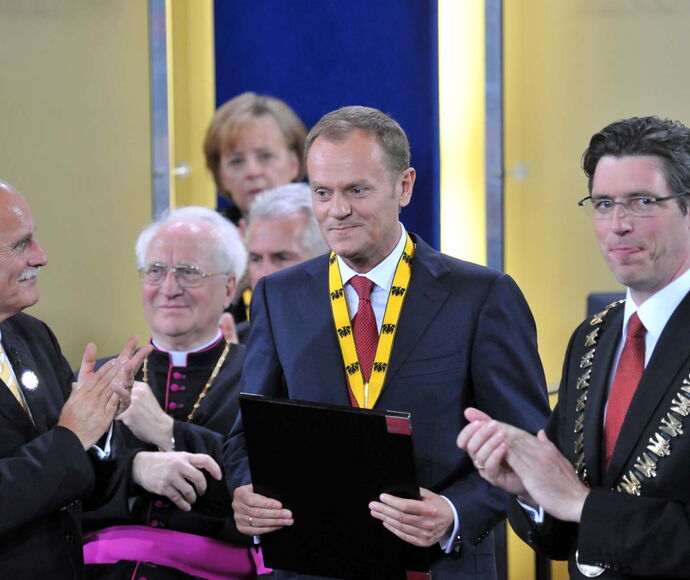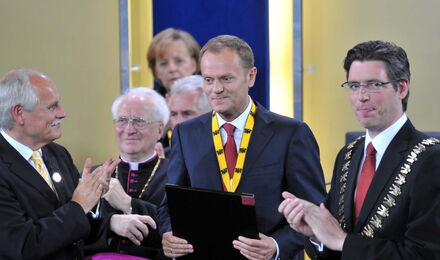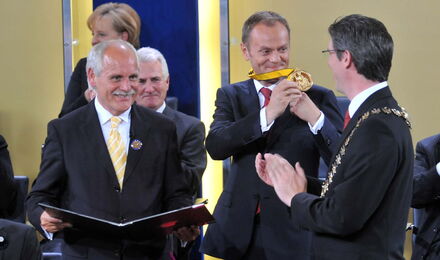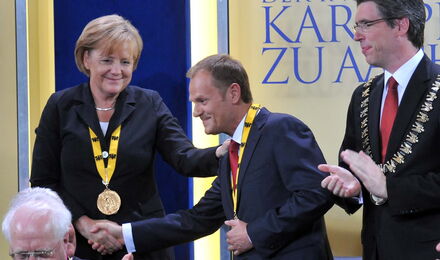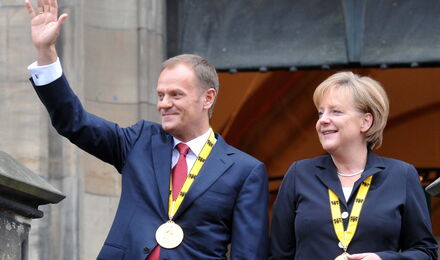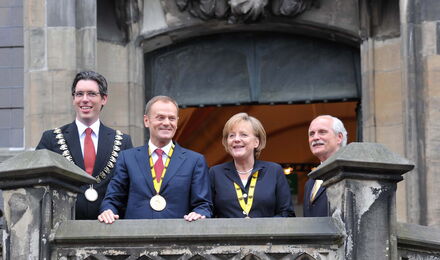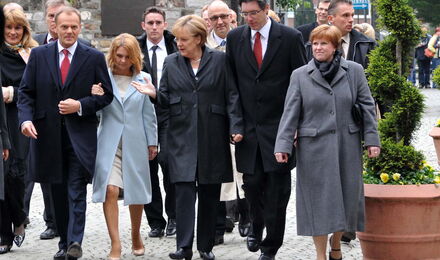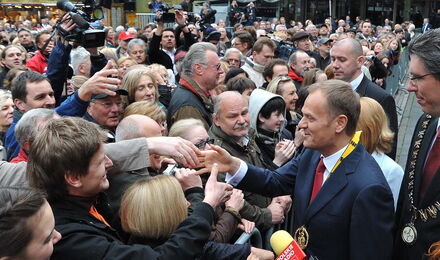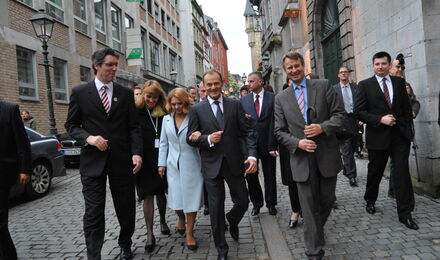In the first decade of the young 21st century, the original community of six has developed into the union of 27, a union that is the foundation for lasting peace and freedom and for stability and prosperity for future generations across the continent. Two decades after the fall of the Iron Curtain, the joint declaration of the City of Aachen and the Board of Directors of the Society for the Conferring of the International Charlemagne Prize of Aachen, composed in 1990, dared to cautiously and hopefully suggest: the comprehensive unification of Europe. Europe is ‘breathing with both lungs again’. This beautiful metaphor, with which Pope John Paul II once described the reunification of Western Europe with its Central Eastern and South Eastern European neighbours, characterises the wealth that the Union has gained.
If our continent has experienced changes of a secular dimension in this sense, then this is most prominently associated with the Polish people's love of freedom. It was the Polish people who repeatedly rose up against the unnatural division of our continent. Their unwavering determination to take their place in a free and united Europe was one of the driving forces that brought about the end of the communist dictatorships behind the former Iron Curtain and made the reunification of Europe possible.
In appreciation of an impressive biography in the service of freedom and democracy and in recognition of his outstanding services to the understanding and cooperation between the Republic of Poland and its European partners, the Board of Directors of the Society for the Conferring of the International Charlemagne Prize of Aachen honours in the year 2010 with the Prime Minister of the Republic of Poland, Donald Tusk, a Polish patriot and great European who, three decades ago, together with numerous members of the Solidarność movement, he laid the cornerstone for the reunification of Europe and today, in the midst of the European family of nations, he stands as a shining example of a democratic and liberal Poland.
Donald Tusk was born in Gdansk on 22 April 1957. He comes from an old Polish-Kashubian family that suffered forced labour and imprisonment in concentration camps during the German occupation. He lost his father, who had suffered serious health consequences as a result of these experiences, while Tusk was still at primary school. Tusk studied history at the University of Gdańsk and graduated in 1980 with a thesis on the Polish independence fighter and national hero Marshal Józef Piłsudski. According to his own statements, he was influenced by the brutal suppression of the workers' protests in the winter of 1970 and quickly came into contact with a number of opposition activists during his studies. During the major wave of workers‘ strikes in the summer of 1980, he helped found the Independent Polish Students’ Association and joined the Solidarity movement. After graduating, he worked as an editor at the renowned publishing house Wydawnictwo Morskie, where he led the trade union group. Not only as a regular author in the weekly magazine Samorzadnoś? (Self-government), but also in numerous protest marches, Tusk was one of those who did not shy away from public confrontation, marching at the forefront of demonstrations – and not infrequently paying for this with physical wounds and injuries.
After martial law was imposed at the end of 1981 and Solidarity was banned, the journalist, who was just 24 years old at the time, had no chance of getting a job with the state. For the next seven years, he worked as a simple labourer in the private cooperative ‘Swietlik’, which was run by like-minded dissidents. At the same time, he continued his political and journalistic activities in the underground.
After martial law was lifted, Tusk became deputy editor-in-chief of the respected ‘Gazeta Gdanska’ in 1989. He left the Solidarity movement and, together with prominent liberals Jan Krzysztof Bielecki and Janusz Lewandowski, founded the Liberal Democratic Congress (KLD), which campaigned primarily for a market economy and privatisation, and for Poland to join the EU as quickly as possible.
Tusk was elected leader of the KLD and in 1991 he was elected to the Sejm for the first time, but lost his seat just two years later in the early elections that were called after the collapse of Hanna Suchocka's government. After this clear defeat, the KLD merged with the Democratic Union to form the Freedom Union (UW), which elected Tusk as its deputy chairman in April 1994. Three years later, he won a seat in the Senate for the voivodship of Gdańsk, where he was elected deputy senate president.
At the beginning of 2001, Tusk was one of the co-founders of the Civic Platform (PO), for which he was re-elected to the Sejm in September of the same year. As its vice-president and as leader of the PO (from April 2003), Tusk subsequently became one of the most influential (opposition) politicians in Poland and was considered one of the most promising candidates for the presidential election in autumn 2005. However, after a hard-fought election campaign, he was defeated by his conservative opponent Lech Kaczynski.
Tusk took over the leadership of the PO parliamentary group and prepared his candidacy for the office of head of government. After the Sejm voted to dissolve itself in September 2007, Tusk, as leader of the opposition, challenged the brother of his former opponent, Jaros?aw Kaczynski, to form a new government. While only a few political observers had expected a change in the office of Prime Minister at the beginning of October, an almost legendary TV debate on 12 October marked a turning point. Tusk's message on that Friday evening was: I will govern the country in such a way that it will finally be able to meet the demands of the 21st century.
When his opponents occasionally accused him of an almost unpatriotic closeness to the German neighbours, he countered with aplomb that he was, of course, pro-German – but also pro-Czech, pro-Slavic and even pro-Russian, because, unlike Kaczynski, he believed in cooperation rather than confrontation in foreign and European policy.
With over 40 per cent of the vote, Tusk finally managed an almost landslide victory; sworn in as Prime Minister in November, he renewed his promise to the partners in the European Union of a policy of friendly cooperation in a spirit of mutual trust: ‘We are working on a new Polish position that amounts to Poland being an active part of all the changes taking place in the EU. [...] We must seek compromises and work to find solutions to problems.’
By taking personal responsibility for European integration and appointing the internationally respected former foreign minister W?adys?aw Bartoszewski as secretary of state and special envoy for international dialogue, the prime minister sent a clear signal at the beginning of his term of office about the importance that the new Polish government attaches to European policy. In his first government statement on 23 November 2007, he announced the imminent signing of the Lisbon Treaty and the rapid introduction of the euro in Poland. ‘This government will do everything to ensure that Poland and the Polish people are quickly ready for the euro.’ He also advocated improving relations with Germany and promoted the revival of the ‘Weimar Triangle’, a close cooperation between Warsaw, Paris and Berlin.After weeks of heated debate, Tusk and President Kaczynski were able to agree on the ratification of the EU Reform Treaty, which was approved by the Chamber of Deputies and the Polish Senate in April 2008. When Kaczynski declared after the failed referendum in Ireland that the treaty was ‘pointless’ and would not be signed by him, Tusk countered: ‘These statements by the president are very unfortunate [...] Ratification is in Poland's interest,’ emphasised the prime minister, reminding his counterpart unequivocally that the head of state himself had negotiated the Treaty of Lisbon.
Kaczynski finally relented and indicated his consent, provided that all the other EU states also ratified the treaty. A few days after the positive second Irish referendum, the head of state finally signed the ratification document on 10 October 2009.
Tusk, for whom Poland's success ‘cannot be separated from the success of the European Union’, emphasised the necessity of partnership and cooperation in the EU, even in the face of the global economic and financial crisis: ‘We see the greatest danger in the crumbling of solidarity within the European Union, in the growth of national egoism, in protectionism [...] There must be only one strategy for all Europeans.’
The Polish Prime Minister also advocates more common ground in the EU's budgetary and energy policy. In addition to the policy of the Eastern Partnership with the Union's eastern neighbours, which he has been pursuing for some time, this should be at the centre of the Polish Council Presidency in 2011, as Tusk already indicated months ago: ‘We are the largest country among the new EU members and perhaps even the most important partner for the old warhorses of the Union. That is why many states are counting on the new EU countries to energetically take the initiative and provide new impetus in connection with our presidency’ (quoted from Polskie Radio, 14 January 2009).
In awarding the 2010 International Charlemagne Prize to the Prime Minister of the Republic of Poland, Donald Tusk, the Board of Directors of the Society for the Conferring of the International Charlemagne Prize in Aachen is honouring an outstanding champion of freedom, democracy and human rights who never bowed to the Communist regime; a convinced and convincing European who is able to inspire enthusiasm for Europe particularly among the young generation, who stands for understanding, cooperation, solidarity and a Poland open to the world, firmly anchored in the European family of nations and returned to the heart of Europe.




